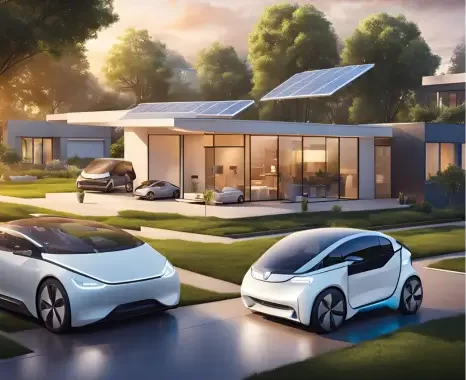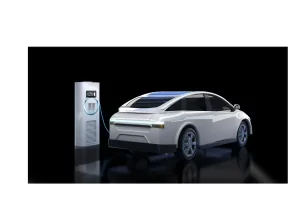The landscape of transportation is rapidly changing with the rise of electric vehicles (EVs). Alongside this shift, the advent of smart home technology is transforming how we manage our daily lives, including our energy consumption and transportation needs. As we move toward a more interconnected future, the integration of smart EVs with smart home systems is becoming increasingly essential. This blog will explore what smart EV integration means, highlight the best apps for electric vehicle owners, delve into connected car technologies, and discuss the future of smart EVs.
Understanding Smart EV Integration
Smart EV integration involves the seamless connection between electric vehicles and smart home technologies, creating a cohesive ecosystem that enhances efficiency and convenience. This integration allows homeowners to manage both their vehicles and home energy systems with unprecedented ease.
The Benefits of Smart EV Integration
- Energy Management: By integrating EVs with smart home systems, homeowners can optimize their energy consumption. For example, you can schedule your vehicle to charge during off-peak hours when electricity rates are lower, reducing overall energy costs.
- Convenience: Imagine arriving home and having your garage door open automatically while your EV begins charging. Smart EV integration can facilitate these kinds of convenient features, making everyday life easier.
- Sustainability: Smart EVs can help reduce the carbon footprint of a household. By optimizing charging schedules and utilizing renewable energy sources like solar power, homeowners can further minimize their environmental impact.
- Data Insights: Smart home systems equipped with EV integration can provide valuable insights into energy usage patterns. By analyzing this data, homeowners can make informed decisions about their energy consumption and vehicle usage.
Best Apps for Electric Vehicle Owners
For electric vehicle owners, leveraging technology can significantly enhance the ownership experience. Here are some essential apps that every EV owner should consider:
Charging Apps
Finding charging stations and monitoring your vehicle’s battery level is crucial for any EV owner. Here are some of the best apps:
- ChargePoint: One of the largest charging networks in the U.S., ChargePoint allows users to locate charging stations, check their availability in real time, and even start charging sessions from the app. Users can filter by charging speed and station type, making it easy to find the best options.
- PlugShare: This app boasts a comprehensive map of charging locations, along with user-generated reviews and updates on station availability. PlugShare also offers filters for different types of chargers and provides options for route planning.
- EVgo: This app focuses on fast charging and offers a network of DC fast chargers across the U.S. Users can locate stations, view charging speeds, and start charging sessions directly from their smartphones.
Vehicle Management Apps
These apps enable users to monitor their vehicle’s performance, schedule maintenance, and control various features remotely:
- Tesla App: For Tesla owners, the official app offers a robust suite of features, including remote climate control, charging monitoring, and vehicle location tracking. Tesla’s app also provides notifications for software updates and maintenance alerts.
- FordPass: This app connects Ford EV owners to their vehicles, allowing them to start the engine remotely, check battery levels, and even schedule service appointments.
- MyChevrolet: Chevrolet’s app provides similar features for Bolt EV owners, including remote start, battery monitoring, and the ability to find charging stations nearby.
Navigation Apps
Optimizing routes for EV charging stops is crucial for long trips. Here are some top navigation apps:
- Google Maps: Recently updated to include charging station information, Google Maps allows users to search for EV charging locations along their route. This feature helps ensure that drivers can find charging stations when needed.
- Waze: Known for its real-time traffic updates, Waze now includes EV charging stations in its navigation options. Users can search for charging points based on their current location or planned route.
These apps not only simplify the process of owning an electric vehicle but also enhance your ability to manage your energy consumption effectively.
Connected Car Technologies
Connected car technologies are vital for the evolution of smart EVs, enabling real-time communication between your vehicle and home systems. Here’s how these technologies are shaping the future of mobility:
Key Features of Connected Car Technologies
- Data Sharing: Connected cars can share real-time data with smart home systems, allowing for a more integrated experience. For example, if your EV’s battery is running low, your smart home system can automatically adjust energy usage to prioritize charging the vehicle.
- Voice Control: Many EVs now offer voice recognition systems that integrate with smart home devices. This means you can control your home’s lighting, heating, and security systems while on the go, simply by using your voice.
- Predictive Maintenance: By utilizing sensors and data analytics, connected vehicles can predict maintenance needs, notifying owners of upcoming service requirements or potential issues before they become serious.
- Remote Monitoring: Owners can monitor their vehicle’s status remotely, receiving alerts about charging progress, battery levels, and maintenance needs directly on their smartphones.
Current Examples of Connected Car Technologies
Several manufacturers are at the forefront of connected car technologies:
- Tesla: Tesla’s vehicles are equipped with extensive connectivity features, allowing for over-the-air updates, real-time traffic updates, and integrations with smart home devices through platforms like Google Assistant and Amazon Alexa.
- Ford: With the FordPass app, Ford vehicles enable remote control of charging and energy management. They are also integrating features that allow the vehicle to communicate with home energy management systems.
- BMW: BMW offers a connected app that integrates smart home functionalities, allowing users to control their home devices and monitor their vehicles from a single interface.
These technologies not only enhance user experience but also contribute to more sustainable energy practices.
The Future of Smart EVs
The future of smart EVs is bright, with several trends shaping the landscape of mobility and energy consumption. Here are some key predictions for the next 5-10 years:
Increased Automation
As artificial intelligence (AI) and machine learning technologies evolve, we can expect increased automation in managing the interplay between home energy systems and EV charging. For instance, AI could predict optimal charging times based on user habits, energy prices, and weather conditions, making charging even more efficient.
Enhanced Interoperability
As more manufacturers adopt open standards, we will see greater compatibility between various smart home devices and EVs. This interoperability will enable a more seamless experience, allowing devices from different brands to communicate effectively.
Sustainable Energy Solutions
Innovations in renewable energy sources, such as solar panels and home batteries, will further enhance the synergy between smart homes and EVs. Homeowners will increasingly invest in solar energy systems, allowing them to charge their vehicles using clean energy, reducing their reliance on the grid.
Smart Grid Integration
The integration of EVs with smart grid technology will enable two-way communication between vehicles and the energy grid. This will allow EVs to not only draw energy from the grid when needed but also return energy during peak demand times, effectively turning them into energy storage devices for homes and communities.
Growth of Mobility-as-a-Service (MaaS)
The concept of Mobility-as-a-Service is gaining traction, allowing users to access various modes of transportation—including shared EVs—through a single app. This trend will likely grow, making it easier for consumers to integrate EVs into their daily lives without the need for ownership.
Real-Life Applications and Case Studies
Many households are already reaping the benefits of smart EV integration. Here are a couple of examples showcasing how families have successfully utilized these technologies:
The Johnson Family: A Case Study
The Johnson family recently made the switch to an electric vehicle and implemented smart home technologies. By utilizing a smart thermostat and solar panels, they optimized their energy consumption. With their EV set to charge during off-peak hours, they noticed a significant drop in their energy bills. Using the ChargePoint app, they easily found charging stations while on road trips, allowing for smooth travel without anxiety over battery life.
The Smiths: Sustainable Living
The Smiths took it a step further by installing a home battery system alongside their solar panels. Their EV not only charged from the grid but primarily from solar energy. They also used smart home integrations to schedule charging times based on weather forecasts, maximizing their use of renewable energy. This integration not only provided them with cost savings but also aligned with their commitment to sustainability.
Conclusion
The integration of smart EVs with smart home technology represents a significant advancement in how we manage our energy and transportation needs. By embracing these innovations, electric vehicle owners can enhance their daily lives, reduce costs, and contribute to a more sustainable future.
As technology continues to evolve, the possibilities for smart EV integration will only expand. Whether you’re an existing EV owner or considering making the switch, exploring the recommended apps and technologies can elevate your EV ownership experience.




